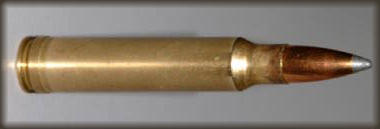

 The Accurate Reloading Forums
The Accurate Reloading Forums  THE ACCURATE RELOADING.COM FORUMS
THE ACCURATE RELOADING.COM FORUMS  Rifles
Rifles  Medium Bore Rifles
Medium Bore Rifles  303 Bullets Weights
303 Bullets WeightsGo  | New  | Find  | Notify  | Tools  | Reply  |  |
| One of Us |
I'm looking at a 303 Martini barreled action as the basis of building a classic stalking rifle. The rifle was converted from 577/450 to 303 in 1896, I assume for the 215 gr service round of that period. The bore is OK but not great and .312. I'd like to use the readily available 174-180 grain bullets rather than hassle with the imported 215s. Does anyone have any experience using these lighter bullets, is accuracy degraded and by how much? Thanks. | ||
|
| One of Us |
174gr was the loading for the MkVII 303 cartridge, as far as I know, the rifling twist was not changed for the later bullet weight from the 1-10 twist of the earlier ones, My 303s of various persuasions all have 1-10 (as near as I can measure) so when loading 174-180gr bullets its just a matter of finding one that your rifle likes. Steve | |||
|
One of Us |
The earlier barrel may or may not have had a different throat. I wouldn't think so. 303's are capable of very good accuracy and I would imagine the Martini-Henry action to be quite rigid. A bullet I would suggest trying is the Hornady 174gr round nose. They say it works well on deer and I have found it to be a good performer but not enough times to make a claim. It is a .312 bullet as opposed to Speer's .311 180gr RN which seems to be a softer construction bullet but have worked for me. Currently, I am using 180gr Highland bullets which are actually a boat tail but with a flat soft point tip. They seem pretty accurate in my two-groove rifle. Oh, being a single shot, you can load out as far you like which helps in 'fitting' the bullet to the throat. I have a few 215gr bullets and apart from being longer, they do not engage the rifling any sooner than the Speer or Hornady bullets - they are actually semi-round nose. And don't be put off by the 'round nose' bullets. They have a reasonable ballistic coefficient. You might consider fire-lapping your bore. I find that gets rid of the 'scale' that forms between the lands and removes sharp edges that scrape the bullet. Well, get someone who knows what he is doing to do fire-lap it. Sometimes, corrosion attacks the muzzle end of the bore more than further back - after fire-lapping, you might want to shorten the barrel a bit. This gets rid of the worst portion of the bore and restores the crown. And since the Martini-Henry cannot be cleaned from the breach, it is likely that the pull through cord of the day has abraded the muzzle end on the bore with dust accumulated on it. But don't let any of this stop you - go for it! Regards 303Guy | |||
|
| One of Us |
Thanks for the replies gents, I was thinking they might have changed the rate of twist when they went to the lighter bullet in WW1. As it stands now it's shooting the Hornady 174 RNs into 1.5" at 50 yds and 5" at 100 yds, might have to give the fire-lapping a try, that or stalk closer. Again thanks. | |||
|
| one of us |
Yo '50.... Good Luck with your 303. Bullet weight aside - especially the "older" 303's are notorious (especially bolt -actions) for "loose" headspace. Fire-lapping, good bullet selection - both solid measures - IMO ensure the Rim/Shoulder/Chamber/Die adjustment is correct and you may have better luck right off the bat with the rifle. Just my $0.02 worth. Cheers, Number 10 | |||
|
| Powered by Social Strata |
| Please Wait. Your request is being processed... |
|

Visit our on-line store for AR Memorabilia

